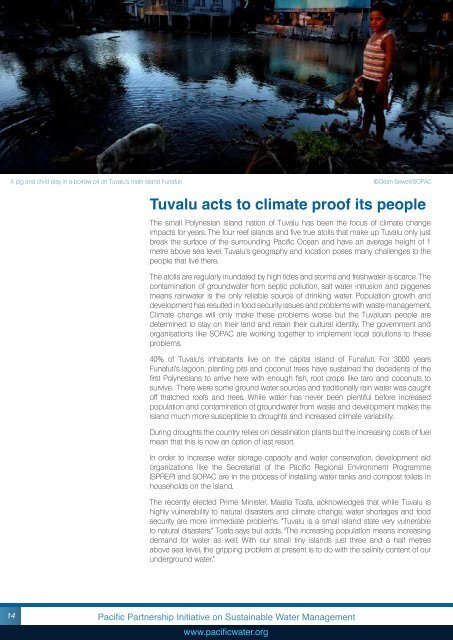Pacific Partnership Initiative on Sustainable Water Management ...
Pacific Partnership Initiative on Sustainable Water Management ...
Pacific Partnership Initiative on Sustainable Water Management ...
Create successful ePaper yourself
Turn your PDF publications into a flip-book with our unique Google optimized e-Paper software.
A pig and child play in a borrow pit <strong>on</strong> Tuvalu’s main island Funafuti ©Dean Sewell/SOPAC<br />
14<br />
Tuvalu acts to climate proof its people<br />
The small Polynesian island nati<strong>on</strong> of Tuvalu has been the focus of climate change<br />
impacts for years. The four reef islands and five true atolls that make up Tuvalu <strong>on</strong>ly just<br />
break the surface of the surrounding <str<strong>on</strong>g>Pacific</str<strong>on</strong>g> Ocean and have an average height of 1<br />
metre above sea level. Tuvalu’s geography and locati<strong>on</strong> poses many challenges to the<br />
people that live there.<br />
The atolls are regularly inundated by high tides and storms and freshwater is scarce. The<br />
c<strong>on</strong>taminati<strong>on</strong> of groundwater from septic polluti<strong>on</strong>, salt water intrusi<strong>on</strong> and piggeries<br />
means rainwater is the <strong>on</strong>ly reliable source of drinking water. Populati<strong>on</strong> growth and<br />
development has resulted in food security issues and problems with waste management.<br />
Climate change will <strong>on</strong>ly make these problems worse but the Tuvaluan people are<br />
determined to stay <strong>on</strong> their land and retain their cultural identity. The government and<br />
organisati<strong>on</strong>s like SOPAC are working together to implement local soluti<strong>on</strong>s to these<br />
problems.<br />
40% of Tuvalu’s inhabitants live <strong>on</strong> the capital island of Funafuti. For 3000 years<br />
Funafuti’s lago<strong>on</strong>, planting pits and coc<strong>on</strong>ut trees have sustained the decedents of the<br />
first Polynesians to arrive here with enough fish, root crops like taro and coc<strong>on</strong>uts to<br />
survive. There were some ground water sources and traditi<strong>on</strong>ally rain water was caught<br />
off thatched roofs and trees. While water has never been plentiful before increased<br />
populati<strong>on</strong> and c<strong>on</strong>taminati<strong>on</strong> of groundwater from waste and development makes the<br />
island much more susceptible to droughts and increased climate variability.<br />
During droughts the country relies <strong>on</strong> desalinati<strong>on</strong> plants but the increasing costs of fuel<br />
mean that this is now an opti<strong>on</strong> of last resort.<br />
In order to increase water storage capacity and water c<strong>on</strong>servati<strong>on</strong>, development aid<br />
organizati<strong>on</strong>s like the Secretariat of the <str<strong>on</strong>g>Pacific</str<strong>on</strong>g> Regi<strong>on</strong>al Envir<strong>on</strong>ment Programme<br />
(SPREP) and SOPAC are in the process of installing water tanks and compost toilets in<br />
households <strong>on</strong> the island.<br />
The recently elected Prime Minister, Maatia Toafa, acknowledges that while Tuvalu is<br />
highly vulnerability to natural disasters and climate change, water shortages and food<br />
security are more immediate problems. “Tuvalu is a small island state very vulnerable<br />
to natural disasters,” Toafa says but adds, “The increasing populati<strong>on</strong> means increasing<br />
demand for water as well. With our small tiny islands just three and a half metres<br />
above sea level, the gripping problem at present is to do with the salinity c<strong>on</strong>tent of our<br />
underground water.”<br />
<str<strong>on</strong>g>Pacific</str<strong>on</strong>g> <str<strong>on</strong>g>Partnership</str<strong>on</strong>g> <str<strong>on</strong>g>Initiative</str<strong>on</strong>g> <strong>on</strong> <strong>Sustainable</strong> <strong>Water</strong> <strong>Management</strong><br />
www.pacificwater.org


